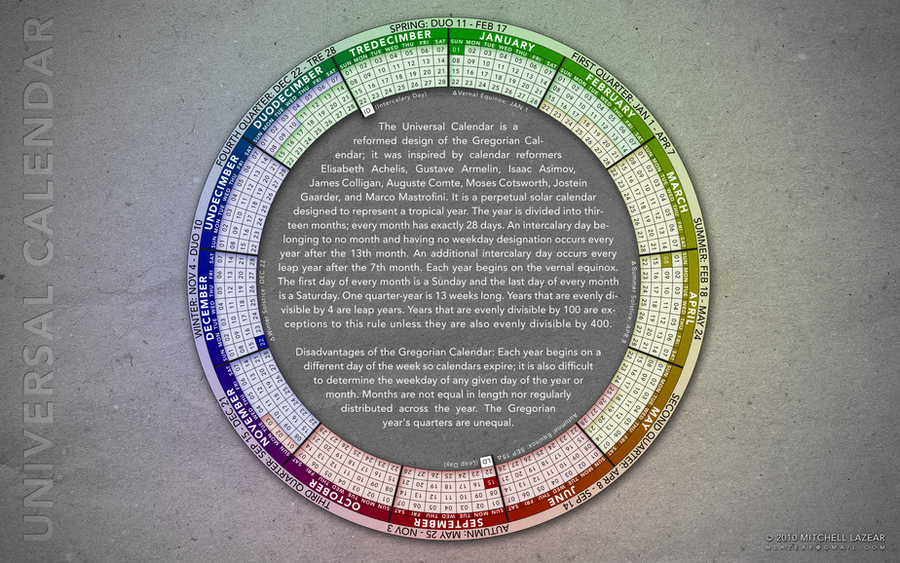Also, has anybody here got an idea for a Hispano-Portuguese "Republican" calendar, ideally with 14 months? Or 15? Or 16?
What do you think about the idea of a "negative leap system"? For example, 16 months with 23 days each give, per year, 3 days too many. What about substracting a whole month every 8 years? Would such a calendar work, with a "Negative Leap Month"?
Well I have an idea for an Hispano-Portuguese Calendar, not exactly a 14 month calendar nor too French Republican.
First some ideas in the construction of the Iberian Republican Calendar or Iberian Civil Calendar (IRC/ICC)
1) the week is of seven days, keeping with social mores, custom and for religious and historical considerations. Historically the Hispanic and Latin-american republicanism were anticlerical, not anti-christian. Also a 10 day week disrupts already established customs and social habits.
2) Using a more Latin language look and a compromise with some names of week and month.
3) 4 seasons of 91 days each one (yes, I am using Asimov's World Season Calendar as a reference)
4) Months of 4 weeks (28 days) or 5 weeks (35 days).
5) an extraday in normal years (un extradia) and a second extraday (duo extradia) in leap years. they are placed between season 2 and 3
6) The first day of the year is the equinox of the 20 of March (primadia, 1 of primibris in the IRC/ICC), like in the old Roman Calendar.
Therefore:
Names of the days of the week of the IRC/ICC (Same names as French Republican Calendar and akin to how they are named in Portuguese)
primadia (Monday), duodia (Tuesday), triadia (Wednesday), quartodia (Thursday), quintadia (Friday), sextadia or sabado (Saturday) septadia or domingo (Sunday)
For comparison:
Days of the week in Spanish: lunes, martes miércoles jueves viernes sábado, domingo
Days of the week in Portuguese: segunda-feira,terça-feira quarta-feira quinta-feira sexta-feira sábado, domingo
Civil Months of the IRC/ICC (each three months is a season)
Season 1 (Equinox 1)
* primibris (4 weeks - 28 days)
* duobris (5 weeks - 35 days)
* tribris (4 weeks - 28 days)
Season 2 (Solstice 1)
* quartibris (4 weeks - 28 days)
* quintibris (5 weeks - 35 days)
* sextibris (4 weeks - 28 days)
* 1 extradia (extra day of normal year)
* 2 extradia (extra day of leap year)
Season 3 (Equinox 2)
* septibris (4 weeks - 28 days)
* octobris (5 weeks - 35 days)
* novembris (4 weeks - 28 days)
Season 4 (Solstice 2)
* decembris (4 weeks - 28 days)
* undecembris (5 weeks - 35 days)
* duodecembris (4 weeks - 28 days)
Last edited:
